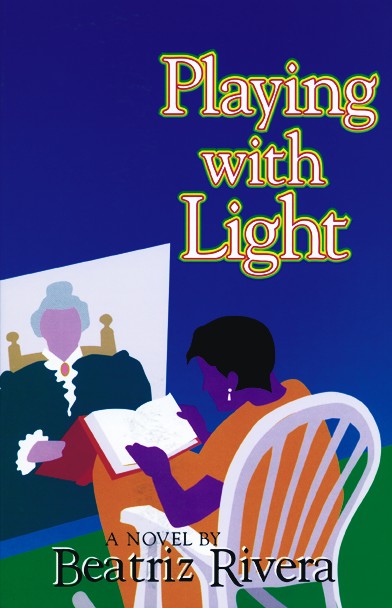When Rebecca, a well-to-do Cuban-American woman, decides that she’d like to revive the old Cuban tradition of the tertulia, or women’s get-together, her best friend dashes her hopes, explaining that in today’s career-driven world even her friends require a compelling reason to come from all over Miami to casually meet and chat. At last, the ingenious Becky hits upon the idea of a reading group, and the book selected is a historical novel about nineteenth-century Cuba: the saga of an aristocratic dress-manufacturing clan, the Santa Cruz family. The novel is called . . . Playing with Light.
Oddly, as they get ever deeper into the story of the Santa Cruzes—especially Tico and Lolo—strange things begin to happen to the reading group. Everyone seems to be . . . sucked in . . . and affected (not necessarily pleasantly) by the saga. (“What’s for dinner, Mommy?” “Get a slice of salami out of the refrigerator, dear. Can’t you see I’m reading?”) As two worlds, from two different centuries, begin to intertwine in odd ways, and her friends begin to . . . well, to disappear, actually . . . Rebecca can’t help but wonder what she’s gotten herself into.
Beatriz Rivera has written an entrancing and wonderfully ambitious novel that places her in the first rank of writers of her generation.
“An inventive, provocative oddity, this is a tantalizing work that draws readers into an engrossing twilight world.”
—Publishers Weekly
“Recommended for fiction collections of all libraries.”
—Library Journal
“What seems at first a straightforward story of Cuban American women in contemporary Miami becomes a fanciful blurring of life, art, and time.”
—Booklist
Beatriz Rivera
Pennsylvania
Beatriz Rivera cleverly conveys the experience of the Latina woman attempting to reconcile her heritage and her existence within the greater construct of the American society in her short stories and novels. Rivera’s characters draw from their distinctive backgrounds to forge a bi-cultural image of themselves and their communities.
Cuban-born Beatriz Rivera grew up in Miami. She finished high school in Switzerland and then went on to study Philosophy in Paris where she received a Master’s degree. Her intention then was to remain in Europe and never to return to the U.S. She began writing her first novel in Paris, while teaching English and Spanish in area schools. Rivera spent ten years in Paris until one day she realized that, as a writer, she didn’t have much of an identity. If she wasn’t Parisian, and wasn’t an American in Paris, what was she?
After returning to the U.S., two of her short stories appeared in journals: the first, entitled “Paloma,” appeared in The Americas Review, and the other, “Life Insurance,” in Chiricu, Bloomington, Indiana. Three years later, her short story collection, African Passions and Other Stories (Arte Público Press, 1995), was published. Other short stories and poems appeared in reviews such as The Afro-Hispanic Review, and in anthologies such as Little Havana Blues (Arte Público Press, 1996) and Floricanto, Si! (Penguin Books, 1998).
Rivera’s three works eloquently demonstrate Rivera’s humor and spirit. Rivera followed her collection of short stories, African Passions, with her novel Midnight Sandwiches at the Mariposa Express (Arte Público Press, 1997). In 2000, Arte Público Press released her third work, a novel entitled Playing with Light. In all three books, Rivera creates a funny yet realistic portrait of the Cuban American female struggling to find her place in the American Dream. Her latest novel, Do Not Pass Go (Arte Público Press, 2006), is about an unlikely love affair between a former child prodigy and a newspaper reporter.
In 2002, Rivera completed her Ph.D. in Spanish Literature on Challenging the Canon: A History of Latina Literature Anthologies, 1980-2000 at the CUNY Graduate Center in New York City. She is an Assistant Professor at Penn State University and lives in Northeastern Pennsylvania with her husband and two children.









